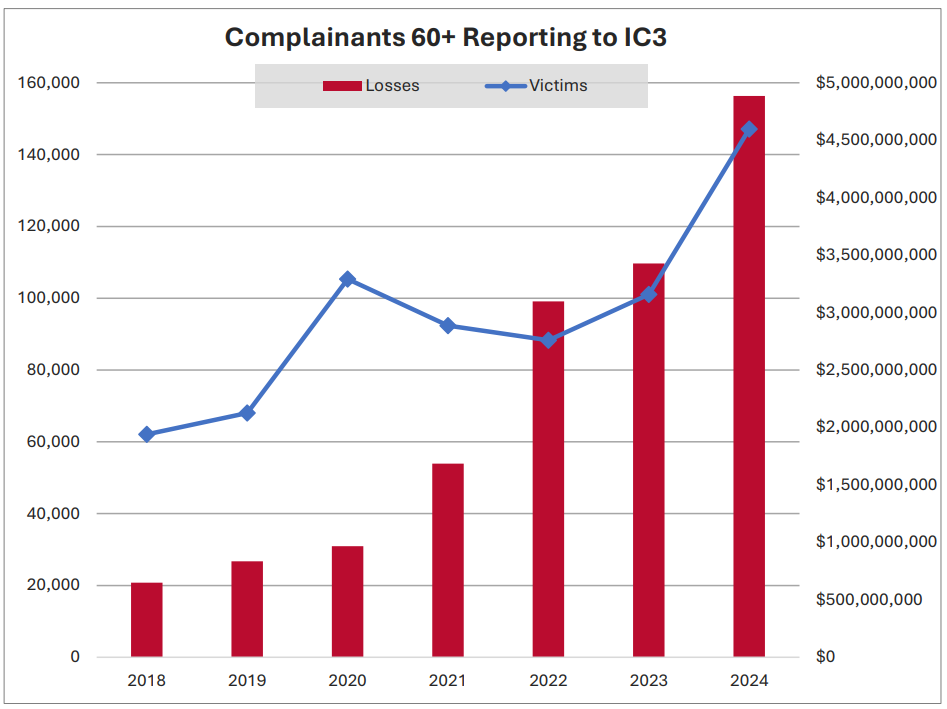[ad_1]
Households that mix open communication with efficient behavioral and technical safeguards can minimize the danger dramatically
30 Oct 2025
•
,
6 min. learn

After we speak about fraud that may inflict a extreme monetary and emotional toll on the victims, it’s not hyperbole. One space the place that is more and more evident is elder fraud, because the quantities of cash misplaced to varied sorts of on-line scams climb sharply yearly.
In 2024 alone, People aged 60+ reported virtually $4.9 billion in losses to on-line scams, a rise of 43 % from the 12 months prior and a five-fold improve from 2020, in accordance with the FBI’s Web Crime Middle. The typical loss from elder fraud was $83,000, in contrast with $19,000 throughout all age cohorts.
Behind these numbers are people and whole households whose well-being and monetary safety had been shaken to the core after years of financial savings evaporated in a second of misplaced belief. The sheer scale of fraud focusing on the aged is one thing that ought to make households take discover and combat again collectively.
Imprecise warnings gained’t minimize it, nevertheless. Efficient safety combines ongoing household communication, human and technical controls, and a transparent remediation plan if one thing does nonetheless go mistaken. As October is Cybersecurity Consciousness Month, now is an efficient time to take inventory of how we may help defend our dad and mom’ and grandparents’ financial savings from scammers.

Why scammers go after the aged
Scammers are rational operators: they chase revenue and low friction. Seniors are engaging targets for a number of intersecting causes:
- Entry to funds: Many seniors have money financial savings, retirement accounts or different steady sources of wealth that fraudsters see as straightforward pickings.
- Belief in authority: Generational habits round belief and authority make some older adults extra receptive to calls or letters that pose as “official.” Many seniors are unlikely to query a name from “the financial institution” or “the IRS”.
- Loneliness: Social isolation could make relationship-based scams, akin to relationship scams, devastatingly efficient.
- Cognitive overload and digital fatigue: Many seniors (let’s face it: not simply them) have a tough time managing dozens of on-line accounts, which makes them extra more likely to fall for “useful” popups or pressing telephone calls.
- Expertise gaps: Many seniors use older units and outdated software program, the identical passwords throughout accounts and, identical to everybody else, typically battle to inform the actual from the pretend.
These are all primary circumstances that may make the attacker’s job simpler. As well as, helpful attackers have helpful instruments at their disposal, together with massive databases of compromised credentials out there in underground boards to AI-driven voice cloning, that conspire to boost the “credibility” of their ploys.
The scammer playbook
Listed below are a couple of schemes that pay nice dividends to scammers focusing on older folks:
Phishing scams
Scammers can pose as IRS, Medicare or financial institution representatives, demanding fee to keep away from penalties or to “unlock” accounts. These schemes typically push victims to enter their login credentials or disclose different delicate info on web sites which are designed to resemble these belonging to official entities.
Tech help fraud
A warning popup on a pc display screen or a telephone name claims that your machine has been compromised with malware. The “help” rep convinces you to grant distant entry, then steals banking credentials or installs infostealer malware in your machine.

Romance scams
Fraudsters domesticate relationships with their “marks” over durations of time spanning weeks or months, earn their belief, after which request massive wire transfers for a fabricated emergency.
Grandparent scams
A caller claims that the one you love is in bother and urgently wants cash wired. Because the ask preys on feelings, victims typically skip verification and oblige with the request, sending the cash requested through wire transfers, reward playing cards, or money-transfer apps. These strategies are sometimes successfully irreversible.
Funding scams
Fraudsters promote pretend investments, akin to crypto schemes or high-yield “personal” choices, utilizing fabricated endorsements from well-known figures.
As fraudulent schemes more and more leverage deepfakes, scammers can clone different folks’s voices or craft movies that seem to contain relations or trusted public figures, making most of the ploys really feel alarmingly actual.
Beginning a dialog
Scams are lengthy identified to invoke a way of urgency, authority and shortage to trick folks into taking motion. Even a momentary lapse in judgement, cognitive overload, stress and sleep deprivation can amplify our susceptibility to scams, which is in the end why prevention is a minimum of as a lot behavioral as it’s technological.
One necessary layer of protection might be laid with open, shame-free communication. Begin with empathy and clarify how scammers manipulate feelings – if they’ll trick tech-savvy folks of their 30s and 40s, anybody can develop into a sufferer.
Or share a narrative: “A buddy of mine has virtually wired a ton of cash after listening to what gave the impression of her grandson’s voice. It turned out to be a rip-off. Can we make a household rule that earlier than sending cash, we’ll all the time double-check?”. In different phrases, take into account implementing a easy plan constructed round “pausing and verifying” in order that a minimum of one different member of the family is the go-to “verification buddy” for any monetary requests.
Additionally, in case your guardian’s or grandparent’s financial institution affords particular protections for older prospects, use them. These might embrace verification requires some forms of transactions, limits on new payees or holds on large wire transfers, and alerts despatched to each the grandparent and a trusted member of the family for any switch above a specific threshold.
Primary machine and account cyber-hygiene
The steps above are finest mixed with measures that may shut commonly-exploited technological gaps. Be sure your older kin:
- use a password supervisor to generate and retailer a robust and distinctive password for every on-line account, particularly the precious ones (e.g., banking, electronic mail and social media),
- when you’re at it, activate two-factor authentication wherever you may, ideally with a cellular authenticator app or perhaps a {hardware} key, reasonably than through SMS messages,
- block popups and robocalls utilizing safety instruments or measures out there from telephone carriers, as applicable,
- activate computerized updates for all units, particularly telephones, tablets, and computer systems,
- remind your kin to not obtain attachments or click on on hyperlinks in unsolicited messages – when unsure, they’ll use ESET’s free, easy-to-use hyperlink checker,
- set up respected safety software program on all their units.
Take into account going by way of these steps together with your guardian or grandparent, and go away clear (and if wanted, written) directions.
If the worst occurs
Velocity is usually of the essence. The earlier you act, the larger the prospect of recovering funds or a minimum of stopping additional theft. In case your (grand)guardian falls sufferer:
- Freeze transfers instantly: Be sure your relative’s financial institution is “within the know” so it stops any outgoing transfers.
- Doc all the things: Save telephone numbers, emails, or screenshots related to the rip-off.
- Report it: File a grievance with the FBI’s Web Crime Grievance Middle (IC3) and the FTC’s IdentityTheft.gov portal.
- Lock down credit score: Place a credit score freeze to forestall new credit score accounts from being opened in your (grand)guardian’s identify.
- Present emotional help to your kin: Remind them that they’re victims of against the law, reasonably than blame them. Disgrace retains folks silent, which in the end solely helps scammers.
Ultimate ideas
For long-term peace of thoughts, take into account additionally id monitoring companies that warn you in case your (grand)guardian’s social safety quantity or login credentials floor on the darkish net. Construct a routine that includes reviewing financial institution balances, auditing transactions, and revisiting account safety settings regularly. On the finish of the day, prevention is a behavior.
The underside line is, scams focusing on seniors are rising in price, frequency and class. However households that mix open communication with efficient behavioral and technical safeguards can minimize the danger dramatically. Put these protections in place and also you’ll make it far tougher for criminals to show your (grand)dad and mom’ life financial savings into their payday.
[ad_2]



